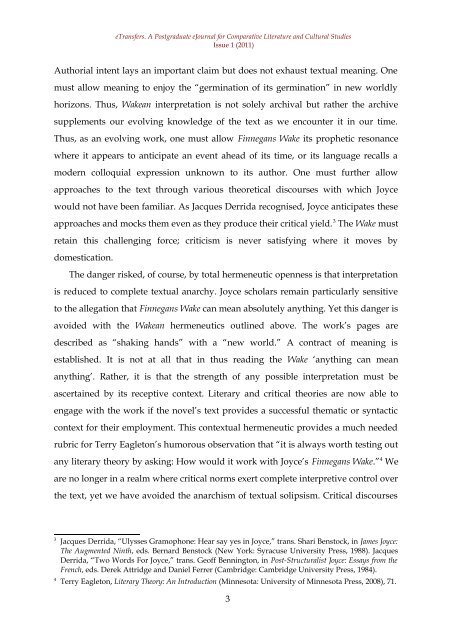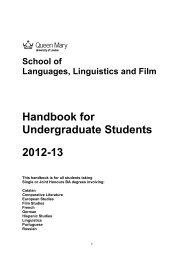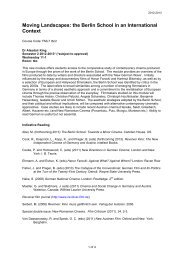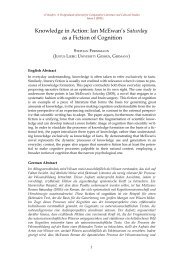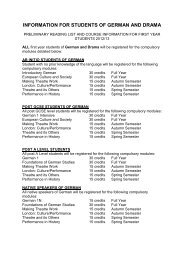Finnegans Wake - Queen Mary, University of London
Finnegans Wake - Queen Mary, University of London
Finnegans Wake - Queen Mary, University of London
You also want an ePaper? Increase the reach of your titles
YUMPU automatically turns print PDFs into web optimized ePapers that Google loves.
eTransfers. A Postgraduate eJournal for Comparative Literature and Cultural Studies<br />
Issue 1 (2011)<br />
Authorial intent lays an important claim but does not exhaust textual meaning. One<br />
must allow meaning to enjoy the “germination <strong>of</strong> its germination” in new worldly<br />
horizons. Thus, <strong>Wake</strong>an interpretation is not solely archival but rather the archive<br />
supplements our evolving knowledge <strong>of</strong> the text as we encounter it in our time.<br />
Thus, as an evolving work, one must allow <strong>Finnegans</strong> <strong>Wake</strong> its prophetic resonance<br />
where it appears to anticipate an event ahead <strong>of</strong> its time, or its language recalls a<br />
modern colloquial expression unknown to its author. One must further allow<br />
approaches to the text through various theoretical discourses with which Joyce<br />
would not have been familiar. As Jacques Derrida recognised, Joyce anticipates these<br />
approaches and mocks them even as they produce their critical yield. 3 The <strong>Wake</strong> must<br />
retain this challenging force; criticism is never satisfying where it moves by<br />
domestication.<br />
The danger risked, <strong>of</strong> course, by total hermeneutic openness is that interpretation<br />
is reduced to complete textual anarchy. Joyce scholars remain particularly sensitive<br />
to the allegation that <strong>Finnegans</strong> <strong>Wake</strong> can mean absolutely anything. Yet this danger is<br />
avoided with the <strong>Wake</strong>an hermeneutics outlined above. The work’s pages are<br />
described as “shaking hands” with a “new world.” A contract <strong>of</strong> meaning is<br />
established. It is not at all that in thus reading the <strong>Wake</strong> ‘anything can mean<br />
anything’. Rather, it is that the strength <strong>of</strong> any possible interpretation must be<br />
ascertained by its receptive context. Literary and critical theories are now able to<br />
engage with the work if the novel’s text provides a successful thematic or syntactic<br />
context for their employment. This contextual hermeneutic provides a much needed<br />
rubric for Terry Eagleton’s humorous observation that “it is always worth testing out<br />
any literary theory by asking: How would it work with Joyce’s <strong>Finnegans</strong> <strong>Wake</strong>.” 4 We<br />
are no longer in a realm where critical norms exert complete interpretive control over<br />
the text, yet we have avoided the anarchism <strong>of</strong> textual solipsism. Critical discourses<br />
3 Jacques Derrida, “Ulysses Gramophone: Hear say yes in Joyce,” trans. Shari Benstock, in James Joyce:<br />
The Augmented Ninth, eds. Bernard Benstock (New York: Syracuse <strong>University</strong> Press, 1988). Jacques<br />
Derrida, “Two Words For Joyce,” trans. Ge<strong>of</strong>f Bennington, in Post-Structuralist Joyce: Essays from the<br />
French, eds. Derek Attridge and Daniel Ferrer (Cambridge: Cambridge <strong>University</strong> Press, 1984).<br />
4 Terry Eagleton, Literary Theory: An Introduction (Minnesota: <strong>University</strong> <strong>of</strong> Minnesota Press, 2008), 71.<br />
3


